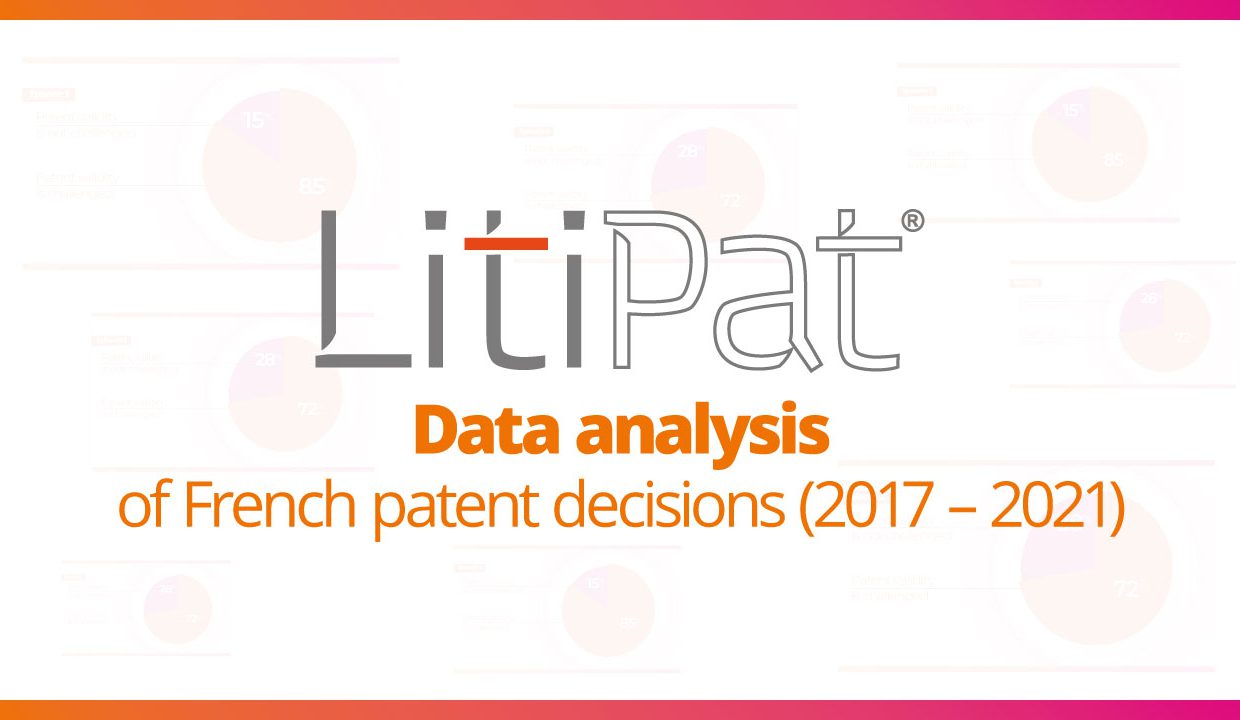
In France, patent infringement and patent nullity actions are indivisible, one is generally used as a counterclaim to the other in French litigation. Thus, in case of patent infringement proceedings, nullity of patent is invoked in 85% of cases.

Among the challenged patents, 72% of patents are ruled valid. “Patent validity is mostly confirmed before French jurisdictions, which is favourable to patent holders”, observes Francine Le Péchon-Joubert, partner at De Gaulle Fleurance & Associés.
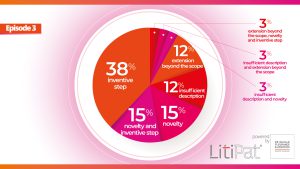
38% of patents are cancelled because of lack of inventive step only. Other grounds of nullity are for 15% for lack of novelty and inventive step ; 15% for lack of novelty ; 12% for insufficient description ; 12% for extension beyond the scope ; 3% for insufficient description and lack of novelty ; 3% for extension beyond the scope and lack of novelty and lack of inventive step. “Grounds for patent nullity are very important as they are not equally successful. Combination of grounds is a way to strengthen its argumentation on nullity » notes Francine Le Péchon-Joubert.
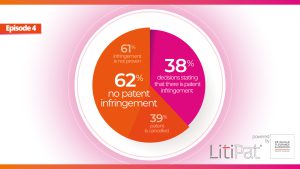
38% of decisions consider patent is infringed and 39% of non-infringement decision are due to patent cancellation. “We note that nullity action is a good defense to an infringement action”.
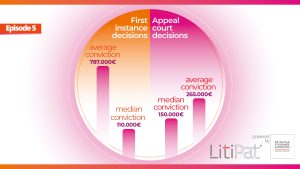
The average amount of patent infringement conviction is much more important before first instance jurisdiction, establishing to 787.000€, than before the appeal court where it is 265.000€ average. Median amount of conviction is 110.000€ before first instance jurisdiction and 150.000€ before appeal court. “We note important differences between average convictions on first instance and appeal. However, the median amount of patent infringement conviction is rather equal” says Carlyne Sevestre, Associate.
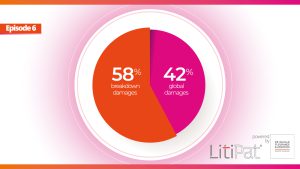
In case of conviction for patent infringement, French judges can decide to allocate damages globally or to breakdown depending on damages, namely lost profit for the patent holder, profit earned by infringer and moral prejudice.
58% of patent infringement conviction are subject to breakdown of damages. “Breakdown of damages requires more motivation from the judges, but it is a way to have a fairer decision which details the damage items” notes Francine Le Péchon-Joubert.

Pursuant to French law, in case of conviction for patent infringement, damages can be breakdown. Grounds of damages are lost profit of the patent holder, profit earned by infringer and moral prejudice of the patent holder. “We note that in over 90% of concerned cases, lost of profit of the patent holder is taken into account. It makes communication of accounting records very important for such evaluation” notes Carlyne Sevestre, Associate.

In 63% of patent litigations on the merits, a saisie-contrefaçon has been performed before. This confirms the interest of practitioners for this preliminary procedure specific to France. “It is a tool that is widely used in France and that other countries envy us”, says Francine Le Péchon-Joubert. “It is one of the keys to success in French patent litigation”.
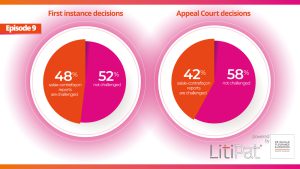
Before first instance tribunal, the validity of a saisie-contrefaçon report is challenged in 48% of cases. This number decrease to 42% before the appeal court. “It confirms that once performed, the saisie-contrefaçon is still strongly challenged by the opposing party throughout the proceedings in order to dismiss evidence” states Francine Le Péchon-Joubert.
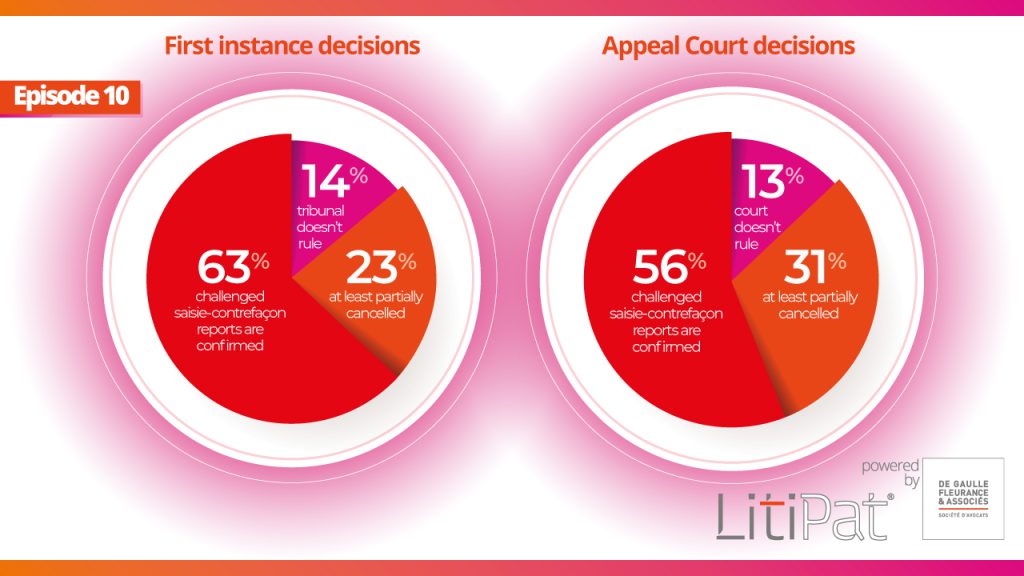
Challenged saisie-contrefaçon reports are confirmed in 63% of cases before first instance tribunal and in 56% of cases before the appeal court. They are partially or totally cancelled in respectively 23% and 31% of cases. Judges does not rule on the validity of the saisie-contrefaçon report in 13% or 14% of cases. “We note that judges generally confirm the saisie-contrefaçon their colleagues have authorized, which make this proof pretty strong” says Carlyne Sevestre.
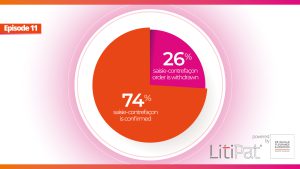
A saisie-contrefaçon order is confirmed in 74% of cases before interim relief judges. “It confirms that once obtained, a saisie-contrefaçon is strong evidence. Except hidden facts once requested, partial behavior of the bailiff or wrong place of seizure, a saisie-contrefaçon is difficult to cancel” note Francine Le Péchon-Joubert.

Proceedings involving only French claimants represent 43% of cases before first instance tribunal. However, it represents 72% before appeal court. “Surprisingly, we note that foreign companies do not use the appeal procedure. It is important to inform them on the particularities of the French appeal procedure in order they take advantage of it.” recommends Charlotte Hébert-Salomon.

Proceedings involving only French defendants represent 64% of cases before first instance tribunal and 70% before appeal court. “These data are not surprising since French jurisdictions are competent in particular when defendant has its headquarters in France, i.e. French companies. However, French jurisdictions are also competent in case of infringement on French territory, meaning that foreign companies can be sued before French jurisdiction on this only rule of jurisdiction ” notes Francine Le Péchon-Joubert.

Before first instance tribunal, 57% of claimants get condemnation of the defendant, however 34% of claimants are condemned to legal fees. “Claimants are mostly successful before first instance tribunal, however there exist a risk of condemnation in case the claim is weak, not well prepared” observes Francine Le Péchon-Joubert.

Before first instance tribunal, 57% of successful claimants involve a foreign party. When claimants are condemned to legal fees, in half cases defendants involve foreign party. “There is a common thinking that French parties are more advantaged before French jurisdiction. But this is not true, foreign companies shall not be afraid to sue a French company in France” encourages Carlyne Sevestre

Before Appeal Court, 82% of judgements are confirmed, and in 16% they confirm but reconsider damages. “Even if appeal decisions mostly confirm judgements, appeal proceedings can be interesting to get damages reconsidered. Such claim is not common but should be encouraged” advises Julien Horn

Before the Appeal Court, 82% of judgements on patent validity or nullity are confirmed. “Chances to see a patent to be declared null by the Appeal Court while it was considered valid before the first instance tribunal, and vice versa, are low” comments Carlyne Sevestre

Average duration of first instance proceedings is 36 months and median is 31 months. For appeal proceedings, average duration is 34 months and median is 27 months, meaning a slightly more important difference. “Patent proceedings in France might seem long, but they are about 2 to 3 years which is not much longer than other commercial proceedings” notes Francine Le Péchon-Joubert

The first instance tribunal grants average legal based on Article 700 of the Code of civil procedure of 87.000€ and median is 55.000€ ; the appeal court grants average legal fees of 40.000€ and median is 20.000€ ; for pre-trial, average legal fees granted is 29.000€ and median is 10.000€. Before first instance tribunal it represents 50% of the legal fees requested by the parties, before the appeal court it represents 44% and for pre-trial it is 37%. “We note that it is before the first instance tribunal that the parties get the higher legal fees and the more in line with the amount they request. Legal fees granted for pre-trial might be considered disappointing while pre-trial may raise complex procedural questions and sometime development on the merits such as validity of patent” comments Charlotte Herbert-Salomon
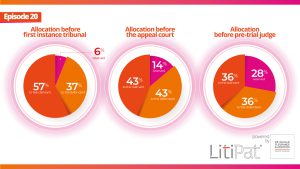
Before first instance tribunal, legal fees are allocated in 57% of cases to the claimant and in 37% to the defendant ; before the appeal court and the pre-trial judge, legal fees are allocated as often to the claimant as to the defendant. In 28% of cases before pre-trial judge, attribution of Article 700 is reserved or declined to both the claimant and the defendant.
“The allocation of Article 700 is far from being systematic before pre-trial judge” warns Francine Le Péchon-Joubert

Before the First Instance Tribunal, litigation involves European patents in 47% of cases, French patents in 20% of cases and both in 33% of cases; before the Appeal Court, litigation involves European patents in 59% of cases, French patents in 26% of cases and both in 15% of cases; before the pre-trial judge, the litigation involves European patents in 74% of cases, French patents in 15% of cases and both in 11% of cases
“The majority of patent litigation concerns European patents, which largely explains the interest in setting up the future Unified Patent Court” notes Carlyne Sevestre
Find more information on Litipat page
De Gaulle Fleurance advised Harmony Energy on the future delivery of France’s largest battery energy storage system
De Gaulle Fleurance advised leading battery energy storage solutions developer Harmo...
Legislative elections 2024: Impact of the candidates’ programs on infrastructure in France
Discover the analysis of our lawyers Caroline Ruiz Palmer and Magalie Dejoux. Conte...